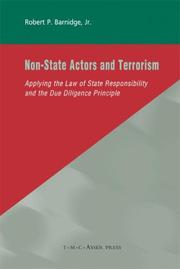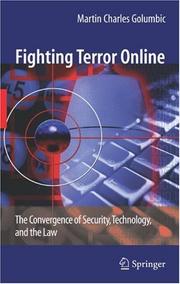| Listing 1 - 10 of 15 | << page >> |
Sort by
|
Book
ISBN: 6611786155 1281786152 9786611786151 1435677978 6000006330 1607503239 9781435677975 9781607503231 1586038516 9781586038519 Year: 2008 Publisher: Washington, DC IOS Press
Abstract | Keywords | Export | Availability | Bookmark
 Loading...
Loading...Choose an application
- Reference Manager
- EndNote
- RefWorks (Direct export to RefWorks)
Over the course of the first decade of the third millennium, terrorism has become a phenomenon that no state, society, or individual can afford to ignore. This volume is compiled in response to the challenge of global terrorism, bringing together scholars and practitioners from around the world who are experts on the study of terrorism.
Terrorism and globalization. --- Terrorism --- Anti-terrorism --- Antiterrorism --- Counter-terrorism --- Counterterrorism --- Globalization and terrorism --- Globalization --- Prevention.
Periodical
Abstract | Keywords | Export | Availability | Bookmark
 Loading...
Loading...Choose an application
- Reference Manager
- EndNote
- RefWorks (Direct export to RefWorks)
Revue de référence française consacrée aux questions de sécurité intérieure et aux enjeux sécuritaires internationaux, Sécurité globale offre une plate-forme de recherche et de débats sur des thématiques comme le terrorisme, la criminalité organisée, les crises sanitaires, la gestion des catastrophes naturelles et industrielles. Son approche se veut autant conceptuelle qu’opérationnelle, selon une logique qui vise à éclairer la globalité des enjeux de sécurité de ce XXIe siècle naissant.
Security, International --- Terrorism --- Internal security --- Internal security. --- Security, International. --- Prevention --- Prevention. --- Anti-terrorism --- Antiterrorism --- Counter-terrorism --- Counterterrorism --- Collective security --- International security --- International relations --- Disarmament --- International organization --- Peace --- Security, Internal --- Insurgency --- Subversive activities
Book
ISBN: 1596932902 9781596932906 9781596932890 1596932899 9781596932906 Year: 2008 Publisher: Boston Artech House
Abstract | Keywords | Export | Availability | Bookmark
 Loading...
Loading...Choose an application
- Reference Manager
- EndNote
- RefWorks (Direct export to RefWorks)
This practical book offers you expert guidance on sensors and the preprocessing of sensed data, the handling of sensed data with secure and safe procedures, and the design, modeling and simulation of complex HS systems. You learn how to store, encrypt and mine sensitive data. Further, the book shows how data is transmitted and received along wired or wireless networks, operating on electromagnetic channels.
National security --- Terrorism --- Telecommunication --- Anti-terrorism --- Antiterrorism --- Counter-terrorism --- Counterterrorism --- National security policy --- NSP (National security policy) --- Security policy, National --- Economic policy --- International relations --- Military policy --- Prevention. --- Security measures. --- Government policy

ISBN: 0750682574 9786611035099 1281035092 0080551882 9780080551883 9781281035097 6611035095 9780750682572 Year: 2008 Publisher: Amsterdam Boston Elsevier/Butterworth Heinemann
Abstract | Keywords | Export | Availability | Bookmark
 Loading...
Loading...Choose an application
- Reference Manager
- EndNote
- RefWorks (Direct export to RefWorks)
The Corporate Security Professional's Handbook on Terrorism is a professional reference that clarifies the difference between terrorism against corporations and their assets, versus terrorism against government assets. It addresses the existing misconceptions regarding how terrorism does or does not affect corporations, and provides security professionals and business executives with a better understanding of how terrorism may impact them. Consisting three sections, Section I provides an explanation of what terrorism is, its history, who engages in it, and why. Section II focus
Corporations --- Private security services --- Terrorism --- Security measures --- Management. --- Prevention. --- Anti-terrorism --- Antiterrorism --- Counter-terrorism --- Counterterrorism --- Business corporations --- C corporations --- Corporations, Business --- Corporations, Public --- Limited companies --- Publicly held corporations --- Publicly traded corporations --- Public limited companies --- Stock corporations --- Subchapter C corporations --- Business enterprises --- Corporate power --- Disincorporation --- Stocks --- Trusts, Industrial
Book
ISBN: 0191716251 1280498498 9786613593726 0191561975 Year: 2008 Publisher: Oxford [UK] ; New York : Oxford University Press,
Abstract | Keywords | Export | Availability | Bookmark
 Loading...
Loading...Choose an application
- Reference Manager
- EndNote
- RefWorks (Direct export to RefWorks)
This book addresses a dilemma at the heart of the 'War on Terror' - whether it is ever justifiable to torture terrorists when innocent lives are at stake. The book analyses the moral arguments and presents a passionate defence of prohibition. It also examines the models of legalising torture suggested in Israel and the US.
Terrorists --- Torture --- Torture (International law) --- Terrorism. --- Terrorism --- Legal status, laws, etc. --- Moral and ethical aspects. --- Prevention. --- Anti-terrorism --- Antiterrorism --- Counter-terrorism --- Counterterrorism --- Acts of terrorism --- Attacks, Terrorist --- Global terrorism --- International terrorism --- Political terrorism --- Terror attacks --- Terrorist acts --- Terrorist attacks --- World terrorism --- Direct action --- Insurgency --- Political crimes and offenses --- Subversive activities --- Political violence --- Terror --- International criminal law --- Criminals
Book
ISBN: 6611968687 1281968684 9786611968687 1607503778 1441601627 6000011938 1597343978 9781607503774 9781441601629 9781586039301 158603930X Year: 2008 Publisher: Amsterdam Washington, DC Fairfax, VA IOS Press Distributor in the USA and Canada IOS Press
Abstract | Keywords | Export | Availability | Bookmark
 Loading...
Loading...Choose an application
- Reference Manager
- EndNote
- RefWorks (Direct export to RefWorks)
This volume in the ""NATO Science for Peace and Security Series"" contains the papers of the Advanced Training Course (ATC) 'Legal Aspects of Combating Terrorism'. The purpose of this course was to support NATO on defence issues related to terrorism and united experts from various disciplines to give participants an understanding of how the various dimensions of the laws and their application fit together. In addition to the lectures that can be found in this book, the course was divided into three modules: the legal response to terrorism in general terms; combating terrorism using lawful mean
Aggression (International law) --- Criminal procedure (International law) --- Terrorism --- Terrorism. --- Acts of terrorism --- Attacks, Terrorist --- Global terrorism --- International terrorism --- Political terrorism --- Terror attacks --- Terrorist acts --- Terrorist attacks --- World terrorism --- Direct action --- Insurgency --- Political crimes and offenses --- Subversive activities --- Political violence --- Terror --- Anti-terrorism --- Antiterrorism --- Counter-terrorism --- Counterterrorism --- International criminal procedure --- International criminal law --- International law --- Prevention.

ISBN: 9789067042598 9067042595 Year: 2008 Publisher: The Hague TMC Asser press
Abstract | Keywords | Export | Availability | Bookmark
 Loading...
Loading...Choose an application
- Reference Manager
- EndNote
- RefWorks (Direct export to RefWorks)
International law. --- Persons (International law). --- Terrorism --- Prevention --- Government policy. --- Prevention. --- International law --- Persons (International law) --- Acts of terrorism --- Attacks, Terrorist --- Global terrorism --- International terrorism --- Political terrorism --- Terror attacks --- Terrorist acts --- Terrorist attacks --- World terrorism --- Direct action --- Insurgency --- Political crimes and offenses --- Subversive activities --- Political violence --- Terror --- Anti-terrorism --- Antiterrorism --- Counter-terrorism --- Counterterrorism --- Juristic persons (International law) --- Law of nations --- Nations, Law of --- Public international law --- Law --- Prevention&delete& --- Government policy

ISBN: 1281134074 9786611134075 038773578X 0387735771 1441925236 Year: 2008 Publisher: New York : Springer,
Abstract | Keywords | Export | Availability | Bookmark
 Loading...
Loading...Choose an application
- Reference Manager
- EndNote
- RefWorks (Direct export to RefWorks)
To see the author talk about the book, Fighting Terror Online, click on the link 'The Academic Channel,' under 'Related links' on this webpage. The unprecedented events that have taken place in recent years have led legislators and governments throughout the world to reconsider and restructure their policies regarding security issues. Today, worldwide attention is being given to a new security threat, in the form of global terrorism. Legal systems are being called upon to provide a response to these threats, in all areas of life, including the online environment. Among its many tools, global terror also uses advanced technological methods. This fact presents a difficult challenge to policymakers. Therefore, we have chosen to focus this book on the issue of formulating appropriate policy at the interface between security and technology, human rights and economic policy. The fundamental issue – the tension between security needs and civil rights – is not new. A great deal of experience has been amassed in various countries in this regard, and the question that now arises is whether the existing system of principles and laws, developed on the basis of experience gathered in the "concrete" world, is applicable to the "digital" environment. This book presents the position that the online environment is a significant and relevant theater of activity in the fight against terror, and will identify the threats, the security needs, and the issues that are unique to this environment. We examine whether the unique characteristics of this environment require new legal solutions, or whether existing solutions are sufficient. Three areas of online activity are identified that require reexamination: security, monitoring, and propaganda. For each of these, we will indicate the issues, examine existing legal arrangements, and offer guidelines for formulating legal policy. There is a demonstrated need to relate to the digital environment as a battlefront, map the new security threats, and thereby hope to provide focus to the pressing discussion on today's legislative and technological agenda. .
Cyberterrorism --- Terrorism --- Prevention. --- Anti-terrorism --- Antiterrorism --- Counter-terrorism --- Counterterrorism --- Attacks on computers --- Computer attacks --- Cyber attacks --- Cyber terrorism --- Cyber war --- Cyberwarfare --- Computer crimes --- Political science. --- Criminology. --- Computer science. --- Criminal Law. --- Political Science. --- Criminology and Criminal Justice, general. --- Computers and Society. --- Criminal Law and Criminal Procedure Law. --- Crime --- Crimes and misdemeanors --- Criminals --- Law, Criminal --- Penal codes --- Penal law --- Pleas of the crown --- Public law --- Criminal justice, Administration of --- Criminal procedure --- Informatics --- Science --- Social sciences --- Administration --- Civil government --- Commonwealth, The --- Government --- Political theory --- Political thought --- Politics --- Science, Political --- State, The --- Law and legislation --- Legal status, laws, etc. --- Study and teaching --- Computers and civilization. --- Criminal law. --- Civilization and computers --- Civilization

ISBN: 0415443245 0203927702 9780414443234 9780415443241 9780203927700 9780415443234 9781134068319 9781134068357 9781134068364 Year: 2008 Publisher: Abingdon: Routledge,
Abstract | Keywords | Export | Availability | Bookmark
 Loading...
Loading...Choose an application
- Reference Manager
- EndNote
- RefWorks (Direct export to RefWorks)
This book offers the first comprehensive and critical investigation of the specific modes of risk calculation that are emerging in the so-called War on Terror.Risk and the War on Terror offers an interdisciplinary set of contributions which debate and analyze both the empirical manifestations of risk in the War on Terror and their theoretical implications. From border controls and biometrics to financial targeting and policing practice, the imperative to deploy public and private data in order to ‘connect the dots’ of terrorism risk raises important questions for social scientists and practitioners alike.How are risk technologies redeployed from commercial, environmental and policing domains to the domain of the War on Terror?How can the invocation of risk in the War on Terror be understood conceptually?Do these moves embody transformations from sovereignty to governmentality; from discipline to risk; from geopolitics to biopolitics?What are the implications of such moves for the populations that come to be designated as ‘risky’ or ‘at risk’?Where are the gaps, ambiguities and potential resistances to these practices?In contrast with previous historical moments of risk measurement, governing by risk in the War on Terror has taken on a distinctive orientation to an uncertain future. This book will be of strong interest to students and researchers of international studies, political science, geography, legal studies, criminology and sociology.
Terrorism --- Privacy, Right of --- Ports of entry --- Prevention --- Risk assessment --- Security measures --- Terrorism risk assessment --- Privacy, Right of. --- 811 Filosofie --- 852 Internationale conflicten --- Invasion of privacy --- Right of privacy --- Civil rights --- Libel and slander --- Personality (Law) --- Press law --- Computer crimes --- Confidential communications --- Data protection --- Right to be forgotten --- Secrecy --- Anti-terrorism --- Antiterrorism --- Counter-terrorism --- Counterterrorism --- Prevention. --- Law and legislation --- Acts of terrorism --- Attacks, Terrorist --- Global terrorism --- International terrorism --- Political terrorism --- Terror attacks --- Terrorist acts --- Terrorist attacks --- World terrorism --- Direct action --- Insurgency --- Political crimes and offenses --- Subversive activities --- Political violence --- Terror --- Terrorism - United States - Prevention --- Terrorism - Risk assessment - United States --- Privacy, Right of - United States --- Ports of entry - Security measures - United States --- Terrorism - Prevention
Book
ISBN: 1281430218 0833045288 0833042998 9780833045287 9780833042996 9781281430212 Year: 2008 Publisher: RAND Corporation
Abstract | Keywords | Export | Availability | Bookmark
 Loading...
Loading...Choose an application
- Reference Manager
- EndNote
- RefWorks (Direct export to RefWorks)
The vast size and highly unregulated nature of the world's waterways have made the maritime environment an increasingly attractive theater for perpetrators of transnational violence. Piracy and sea-borne terrorism have been on the rise since 2000. While the United States has spearheaded several important initiatives to improve maritime security, the author urges policymakers to consider four additional measures to safeguard the world's oceans.
Maritime terrorism -- Prevention. --- Merchant marine -- Security measures -- United States. --- Piracy -- Prevention. --- Security, International. --- Shipping -- Security measures. --- Terrorism -- Prevention. --- Unified operations (Military science) -- United States. --- Merchant marine --- Security, International --- Shipping --- Maritime terrorism --- Terrorism --- Piracy --- Unified operations (Military science) --- Military & Naval Science --- Law, Politics & Government --- Navigation --- Security measures --- Prevention --- Security measures. --- Prevention. --- Joint operations (Military science) --- Unified commands (Military science) --- Anti-terrorism --- Antiterrorism --- Counter-terrorism --- Counterterrorism --- Collective security --- International security --- Mercantile marine --- Unified operations (Military science)Security measures --- Military art and science --- Strategy --- Tactics --- International relations --- Disarmament --- International organization --- Peace --- Marine service --- Merchant marine - Security measures - United States --- Shipping - Security measures --- Maritime terrorism - Prevention --- Terrorism - Prevention --- Piracy - Prevention --- Unified operations (Military science) - United States
| Listing 1 - 10 of 15 | << page >> |
Sort by
|

 Search
Search Feedback
Feedback About UniCat
About UniCat  Help
Help News
News